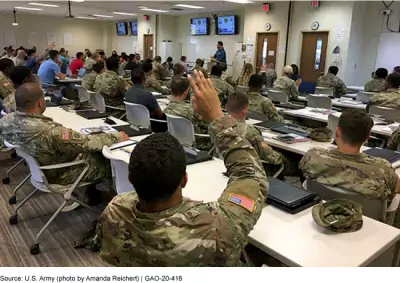Helping Service Members Transition Back to Civilian Life
Issue Summary
Helping veterans overcome challenges to transitioning to civilian life—such as unemployment, homelessness, mental health issues, and disability-related issues—is essential. The Department of Veterans Affairs (VA), the Department of Defense (DOD), and other federal agencies offer supports and services to facilitate this transition.
However, agencies could improve some of these supports and services.
For instance:
- SkillBridge. DOD offers the SkillBridge program to service members who are transitioning back to civilian life. The program allows them to participate in a civilian job and job training up to 180 days before they leave military service. About 12,000 service members participated in the first half of FY 2024. The services reported that 83% were enlisted personnel. However, the services don't consistently collect or analyze data about service members' participation in the program.
- Warm handovers. Transitioning from military to civilian life can be difficult for some service members as they may lose access to housing, pay, healthcare, and more. DOD provides certain at-risk service members with a person-to-person connection—known as a "warm handover"—to support agencies like VA. But DOD doesn't ensure that warm handovers take place. From April 2021-March 2023, more than 4,300 at-risk service members didn't receive this assistance. Also, DOD hasn't assessed whether warm handovers are helpful.
- Veteran Rapid Retraining Assistance. This VA program helped more than 13,000 veterans who lost their jobs during the COVID-19 pandemic. Specifically, the program offered a housing stipend and 12 months of tuition and fees for eligible veterans to retrain for high-demand occupations. VA collected a lot of data from schools and veterans on program benefits and challenges, but has not developed any plans to use the data to formally evaluate the program.
- Veteran Employment Through Technology Education. This VA pilot program helped more than 6,700 veterans enroll in technology education programs from May 2019-May 2022. While about 66% of those enrolled completed training, VA does not calculate an employment rate for all participants who completed the program. As a result, VA lacks sufficient information to compare it to other programs or assess how effectively it helps veterans get jobs.
- Transition assistance program. DOD tailored its transition assistance program to meet individual service members' needs based on how prepared they are to transition back to civilian life. Nearly a quarter of service members who need maximum transition support did not attend a 2-day tailored class focused on topics like higher education and vocational training. Most service members also did not start the transition process at least a year in advance, as required. DOD has not leveraged performance information to better understand root causes, inform decision-making, and improve results for this program.
- Civilian employment. DOD has programs to help service members transition from military service to civilian employment. One program matches military training and skills with civilian occupations and provides resources to help service members get the credentials they need. Another allows servicemembers to meet civilian apprenticeship requirements while on active duty. DOD currently tracks participation in and completion of these programs but doesn't have adequate evidence to show that the programs are working.
- Program goals. 45 federal programs help service members, veterans, spouses, and dependents establish civilian careers. While these programs frequently provided similar services to similar populations, they have reported efforts to coordinate activities—such as co-locating educational and career counseling services. However, 8 of these programs reported having no goals that define program achievements. Developing such performance goals and taking steps to assess outcomes could help agencies better monitor program performance.
A Transition Assistance Program class helps members of the U.S. Army transition to civilian life after service.
Image

- Coast Guard's transition program. The Coast Guard is required to provide its servicemembers with counseling, employment assistance, and information on veterans' benefits through its Transition Assistance Program (TAP). However, the Coast Guard lacks complete and reliable data on participation in this program. Because commanders can play a key role in bolstering TAP participation, giving them a way to readily determine whether service members under their command have completed TAP could help.

